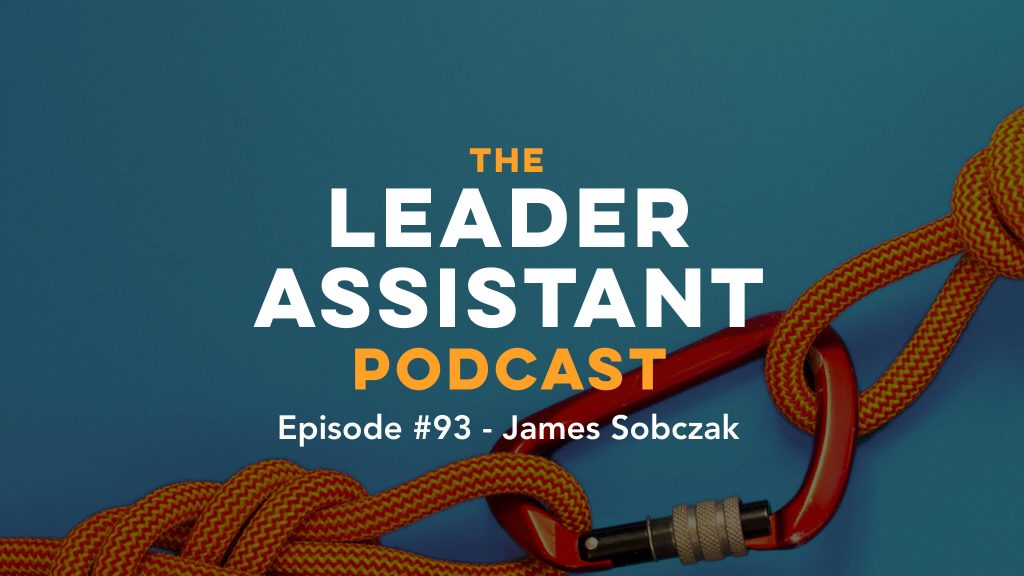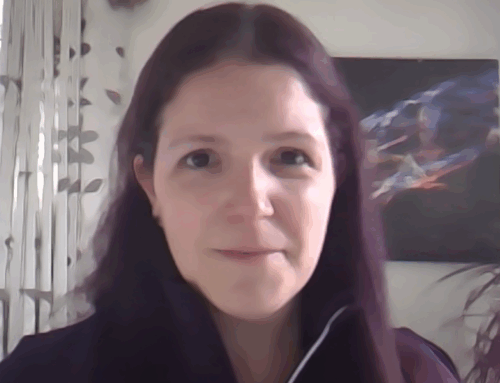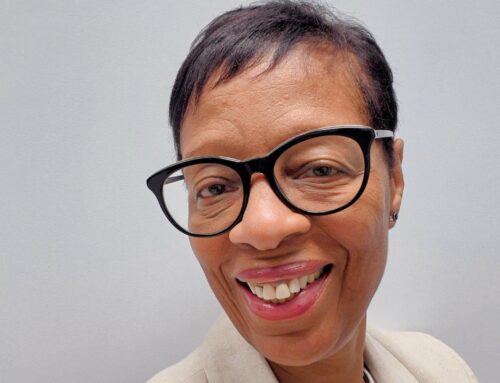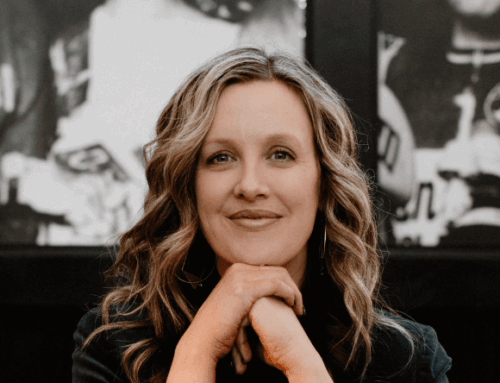UPDATE: Unfortunately, James passed away on October 12, 2022. My condolences to his family and friends.
James Sobczak [SOB-zak] is currently an executive assistant staffing both the Chief Physician & Dean for Clinical Affairs and the Dean for Academic Affairs in the Biological Sciences Division at the University of Chicago.
James is a kind, articulate, wise executive assistant and I’m so thrilled to share our conversation! James talks about being a male assistant in a female-dominated profession, how he’s prioritized professional development and growth opportunities, and how we should see our role as a career, not just a stepping stone.
LEADERSHIP QUOTE
Leadership is a potent combination of strategy and character. But if you must be without one, be without the strategy.
– Norman Schwarzkopf (Former U.S. Army General)
THE LEADER ASSISTANT BOOK
Download the first 3 chapters of The Leader Assistant: Four Pillars of Game-Changing Assistant for FREE here or buy on Amazon here.
JOIN THE FREE COMMUNITY
Join the Leader Assistant Slack Community here, or the Facebook Group here for bonus content and to network with other assistants who are committed to becoming leaders!
CONNECT WITH JAMES
ABOUT JAMES
James Sobczak [SOB-zak] is an executive assistant staffing both the Chief Physician & Dean for Clinical Affairs and the Dean for Academic Affairs in the Biological Sciences Division at the University of Chicago. He has been employed there since 2002. A proud member of the International Association of Administrative Professionals [IAAP] since 2008, James’s past lives in the convention & trade show industry, high-end retail, theater, and radio broadcasting have provided him with a breadth of experience and expertise that mesh with and enhance the administrative skills that he brings to his work every day.
SUBSCRIBE
Subscribe to The Leader Assistant Podcast so you don’t miss new episodes!
You can find the show on Apple Podcasts, Spotify, Google Podcasts, Pandora, and Stitcher.
Join my email list here if you want to get an email when a new episode goes live.
LEAVE A REVIEW
If you’re enjoying the podcast, please take 2 minutes to rate and review the show on Apple Podcasts here. Each review helps me stay motivated to keep the show going!
—
EPISODE TRANSCRIPT
Hello, I’m James Sobczak today’s leadership quote comes to us from former US Army General Norman Schwarzkopf leadership is a potent combination of strategy and character. But if you must be without one, be without the strategy.
Podcast Intro 0:17
The Leader Assistant Podcast exist to encourage and challenge assistants to become confident, Game Changing leader assistant.
Jeremy Burrows 0:25
Thank you for listening to The Leader Assistant Podcast. Hey friends, thanks for tuning in to The Leader Assistant Podcast. It’s your host Jeremy Burrows. And today I’m speaking with James Sobczak from the University of Chicago. James is an executive assistant to both the chief physician and Dean for Clinical Affairs and the Dean for Academic Affairs in the biological sciences division. That was a mouthful. But James, how’s it going?
James Sobczak 0:53
It’s going very well. Thank you so much for having me on the program.
Jeremy Burrows 0:56
And where are you at in the world.
James Sobczak 0:59
I’m currently in Chicago, I work in Chicago, I live in a small suburb just south of the city. Awesome.
Jeremy Burrows 1:06
Well, thanks for joining us today. And we’re gonna just jump right in and talk about your very first job and what skills you might have learned from that first job that you still use today.
James Sobczak 1:17
Sure, my very first job of enough was when I was in high school, I was working at a secure as a security guard at McCormick Place. My father spent his entire career in the trade show and convention industry. And through his various network contacts at the time, he was able to get me a job doing second shift security work on exhibit booths, at various trade shows that were going on in McCormick Place, which is the main Convention Center here in the city. Through that I learned lots and lots of patients, because my shift started at five o’clock, and it ended at 1130. And the evenings would get very, very dull very, very quickly. And yet, there was still very expensive things on the exhibit booths, they had to be watched to protect it because you never knew who was going to come on to the floor and decided to do a little free shopping for themselves. But I was able to learn how to manage my time in doing homework in fits and starts. So that I could keep up with my academics at school, and also just the value of patience and, and being in the moment and keeping watch on things. And those are things that actually still I bring with me to the program every single day when I come into work.
Jeremy Burrows 2:40
So did you have any serious attempts at somebody trying to steal something?
James Sobczak 2:46
There were times that that would happen, especially if you were on the very first day, the opening day of the show or the night before the show or the night that the show was closing. The show floor descends into this massive chaos, where there’s all kinds of crates that are being brought on to the show floor, both to pack up product and to pack up sections of exhibit booths and things like that. And there’s lots and lots and lots of people on the floor. And sometimes you think that they’re there for a specific reason. And sometimes they’re not there for a specific reason other than to help themselves to stuff. So that’s when being watchful and being vigilant on the floor was very, very much the first primary thing on my mind.
Jeremy Burrows 3:36
Cool. So when and why did you become an assistant?
James Sobczak 3:42
When did I become an assistant, I became an assistant sometime around 2001. That was the that was the time I made my decision mid 2001. I had worked in a number of positions and a number of industries and what I call my past lives. I worked in the trade show and convention industry not just insecurity in high school, but I worked for a large tradeshow contractor. Here in the Chicago area. I work for two smaller independent contractors that helped set up and take down exhibit booths. I was in various forms of sales and operations in those areas. I had worked in high end retail, in order to put myself through school. I had also worked in high end retail and what I thought was going to be my career. I worked in radio for a little while, right after I graduated from college, that’s where I thought my primary career was going to be in fact, and I had all these different things that I had tried that I couldn’t make stick for radio radio was concerned it was for circumstantial reasons for the tradeshow industry. It was incredibly high stress and the burnout rate was very, very high. And I saw the toll that it took on people not necessarily me but on other people with whom When I worked in that I knew, and I realized that that wasn’t for me. And then I thought that high end retail or other form of sales, were going to be the way. And I found that I wasn’t happy doing it, I just could never really buckled down on the sales part, even though there was good money to be made. After a lot of soul searching, I realized that all of my past lives had this through line, this connective thread of administrative work. And it was always the administrative work that I realized, to my surprise that I enjoyed the most actually, it was the phone calls the writing of contracts, the all the backstage work, if you will, that goes into doing these other jobs. And after talking for a long time with my who my girlfriend who became my wife, and after a lot of counsel from my father who’s VBAC I prize very, very highly, I realized that what I really, really wanted to do was to professionally reinvent myself, and reinvent myself as an administrative professional. So in 2001, I made the decision, I revamped my resume and looked at it through a different camera lens, to apply all the various administrative skills that I had picked up, piecemeal, here and there and apply it to positions. Through a number of part time positions. I eventually landed in a part time gig here at the University of Chicago, as a receptionist, sitting literally in the exact same desk where I am sitting right now, many, many years ago, the dean of the division at the time, saw something in me and gave me a glowing reference, which got me my first full time job here at the University in 2002. And I’ve never left, I’ve made a long term career of my profession, at this place. Wow.
Jeremy Burrows 7:08
That’s crazy. So yeah, so you’ve been there for a while. And yeah,
James Sobczak 7:12
I have Yeah, I’m, I’m a long term in loyal employee there are there are employees both within medical center proper, and within the university that have literally decades of time spent here, one can spend one’s entire career here and retire from here. I’ve seen people do it. And it’s I’ve attended some five and 10 and 15 year anniversary celebrations. Because I’m at that point now, but I’ve seen people that have been here 3540 4550 years, and they’re still coming here to work, and they still love to come here to work. And it’s an absolutely remarkable thing.
Jeremy Burrows 7:51
So what is it that kind of maybe, is there even just one thing you could share? That is maybe why that’s the case? Like why do you enjoy coming to work there? Why have you stuck it out? I’m sure you’ve had some, you know, bad days or bad months or even bad years. But you know, what’s keeping you there?
James Sobczak 8:13
That is a very good question. And, and I do, and I do think about it, because you are right, there are bad days, there are bad weeks, there are sometimes bad months. Fortunately, I haven’t had a bad year, which is very helpful. But there are a couple of singular reasons why I stick around here. One of them is this place allowed me to reinvent myself. And in allowing me to reinvent myself, it allowed me to make mistakes. And it allowed me to learn from those mistakes. I had people who were far smarter than me far more proficient at their jobs, whether it was administrative or otherwise, from whom I could learn and from whom I could glean lessons, and from whom I could receive feedback and counsel, both day to day short term, midterm long term. And there are so many different areas, both academically and professionally where one can work. If you think about it, this campus, just in the Chicago area has a population of about roughly 15,000 new people. That’s the size of a very large town or a small city. And one can move around from one division to another from one department in a division to another. One can move to a different center on the other side of the world. The University has a number of different academic centers in the Pacific Rim in in the Middle East, in continental Europe, and there are Are positions there that we’re one can apply one’s skills and one can continue to advance one’s career, which is an absolutely remarkable thing. I jokingly say that, like the former British Empire, the sun never sets on the University of Chicago. There’s always some presents, it seems, on the planet where the sun touches it. And and it’s really a rather breathtaking thing. That’s one big part of it. And secondly, from a pragmatic standpoint, being the sole breadwinner in my house, I know that the pay is very good. And the benefits, the benefits package is also very, very good. So that my wife and my two children are well provided for and we’re, we’re medical and dental and things are concerned. And it’s, and that package is one of the big things that keeps me here as well. And it’s tough to beat. So it’s a vote both from an idealistic standpoint, and from a pragmatic standpoint, there are a number of very compelling reasons why I stick around.
Jeremy Burrows 11:09
That’s great. So you’ve been there, you know, you’ve been there a while you said there’s a lot of room for maybe moving around, and the org or even moving cities, different parts of the large, you know, organization, how have you How have you grown your skills, and develop new skills over your time there,
James Sobczak 11:31
I’ve had to do a lot of growing of my own skills and developing of my own skills kind of on my own. I will talk wherever I can with other colleagues and peers of mine, both inside the division and in other departments where I used to work in talking with them, getting q&a, best practices, I do a lot of that I also do copious amounts of reading, whether it’s whether it’s books, or online articles, and it’s not just about the hard skills, it’s about the soft skills as well, how to apply all these various things. So I’m not just an administrative professional, and I’m not just an executive assistant, but also as an ambassador, and as an emissary for my two executives, not necessarily speaking for them. But being a watchful guardian of them and of their time, and of the various things that they have going on. There is some professional development that is available here at the university. But it’s not quite as fully developed, as it is in other areas. So I have been able to find other opportunities for that outside of campus in order to in order to continue my lifelong education.
Jeremy Burrows 13:01
Also awesome. And so one of those avenues that you mentioned in your bio, is you’re a proud member of the International Association of Administrative Professionals or IWC. Yes. Could you share kind of why you’re a member and what you’ve learned or gained from being a member?
James Sobczak 13:20
Yeah, sure. I joined for the simple reason that I like, like, like, like Phoenix Normand and said, I needed to find a tribe. I wasn’t finding it here, much. To my surprise at the university. I wasn’t finding it in the division, where I’m currently working on where I was working in the past, I needed some type of network of like minded people. And I not being able to find it here. For various reasons far, far beyond my control. I began to search outward, and I was looking around at what types of groups or associations or peer groups might be available. And just on a random search, I came across the IW EP. And I did a little homework on the group and I realize that they’re the oldest association of its kind in the world. They got their start in the mid 1940s. They are a global organization, they have much like the university, they have a presence in Europe, in Canada, in South America, in India, in the Pacific, in Australia and New Zealand. They have all these people that have this global web of connectivity and interconnection, which really jazzed me a lot. And at the time, there was a local chapter that was having regular meetings downtown. And I figured what the hey, I would go and try a meeting out, see what I thought I was, as I tend to be the only male administrative professional in the room, I didn’t really let that bother me. But I was warmly welcomed, I was warmly received, the food they ordered was good, which was unnecessarily bad. And I was able to find very quickly, like minded colleagues and peers, many of whom became very dear friends. And I have held on to those connections. That was in 2008, when I joined officially, and I’ve kept up my membership, I’ve been able to attend a number of my Association’s annual meetings, three of them to be exact. And I have always been able to reconnect with people there at those meetings, and pick up right where we left off as if we had just put the phone down last week on a phone call. So and it’s the constant collective intelligence, and the brain power that the members bring to the table. Because the membership and the leadership very, very much one to the other to succeed. And the association is also very much a, an advocacy group, trying to push forward and advance the concept of the Administrative Professional as not just an admin, but so so much more, which is one of the things that you have touched on as well. There is so much more than we can do. There was so much more to our skill set. And the current leadership and the current CEO, Dr. Veronica Cochran, is a huge, huge believer and proponent of that. So it is really, really nice to pitch my tent in that camp, knowing that we’re all sort of moving this forward together. It’s a great feeling. And it’s one of the one of the big, big reasons why I stick around with them. That’s awesome.
Jeremy Burrows 17:04
That’s great. Yeah, I think it’s huge. I talk a lot about this, some in my blog, and I’ve talked about a little bit in some of the episodes of the podcast, and then also in my book that I’m currently writing, and potentially will be published by the time this episode airs. I’m not sure yet. So I’m not gonna promise anything. Just the same. But, but I talked about networking and how I didn’t network in my last job. And then when I was in between jobs, I was like, Well, I don’t have it’s kind of crickets, I don’t have anybody to reach out to I don’t have anybody to support me and encouraged me and to help me introduce me to, you know, an executive that needs an assistant. And so yeah, I love that you kind of went outside your organization and made it happen.
James Sobczak 17:54
Yeah, thank you very much. It was an I encourage anybody to do that to go out and find your network or find your tribe or find like minded people, even if it’s two or three, you would be amazed, what support and what strength and structure that gives you. So you’re not feeling like you’re just on your own. It’s very much we are all in this together. I heartily encourage that to anybody.
Jeremy Burrows 18:20
Yeah. So let’s talk a little bit about how we can advocate for the EAA role as a career not just a stepping stone?
James Sobczak 18:29
Yeah, yeah. The one of the big things that I’ve had a good fortune to do was to go to some kind of a junior college that’s in the Chicagoland area and talk with the members of sort of the Administrative Professional Education program. There’s sort of a an academic track at this particular college and suburb just west of the, of the city. And it’s been a great thing for me to just talk with both the female members of the class and the male members of the class as well and say, Here I am, I’ve done it. I didn’t have an education track, like you guys have to give you the skills, the skill set and the basic foundation of what you need to do in order to succeed in a position and to succeed in a career. I tell him, I had to learn a lot of it by the seat of my pants. I mean, it worked out, okay. But I think about how much better I could be. If I had, if I had found myself in a track like that. And, and I’m always encouraging of them to say that you can absolutely make a career out of this. I would submit further that when you go to a high school, and you talk to these kids, male and female at a career fair, that it’s not just about, you know, going to a college or university and getting a degree, but you can also go to another college, or a four year college or in many cases, to your junior college, and find an academic program track like this, and get a degree and more importantly, get yourself out in the workplace and get yourself the practical experience that you need. Because a lot of these colleges have a pipeline set up, or at least high schools have pipeline set up into these junior colleges. And the high schools want their students to succeed, and the colleges want the students to succeed. So it’s trying to find a way to mesh those two levels, academic levels together, to give the students a really nice Thruway into what could be a really rewarding career. And it takes a lot of work. I mean, it takes a lot of drive. But it takes a lot of work and a lot of drive for any position you go into. But I’ve always been a big proponent of that. It just started early. We talked about it in college, I would think that we should start talking about it in high school and see where we go from there.
Jeremy Burrows 21:04
Yeah, I love that. So what, let’s talk a little bit about the male female dynamic, yes, because I’ve kind of seen that, okay, even even some of the advocates that say it’s not just an admin, it’s a career. That’s the way maybe the way it’s presented, or the way that they talk about it. It doesn’t really strike a chord with a lot of a lot of men that, you know, you know, not to get too far into, into what your belief system is. But you know, I personally believe that men and women are equal, but they are different. And they have different skills and different, they’re wired differently. And so,
James Sobczak 21:51
science reinforces that we’re men’s brains are wired differently. Not neither good nor bad, just differently from each other.
Jeremy Burrows 21:58
Yeah. And so, you know, a lot of the times, you know, early on in my career as an assistant, anytime I see an assistant event, or or maybe, again, I wasn’t super networked in my last job. So I was a little, a little bit on an island, but but it just wasn’t appealing to me, it wasn’t challenging me and calling me it wasn’t treating it as, like, a respectable career for a young man. And yeah, that where you could provide for your family, if that’s what you wanted to do. And so anyway, how, just share a little bit about your experience, being a male assistant in a room full of female assistants at events and conferences? And then just how you’ve kind of advocated for yourself? Kind of,
James Sobczak 22:50
you know, it’s it’s a, it’s a good question that you ask, and it’s an it’s a tough question. Because it factors in a lot of a lot of camera angles, a lot of dynamics and a lot of perceptions about not just males, the professional females, the professional, but the profession itself. I, the way that I represent for myself, and I tend to do this subtly, is I show up, I look for networking opportunities, where I can, when I can afford to go, because sometimes there are some costs involved. When I know I have a free evening, and I know that I can show up to an event without sacrificing my responsibilities or my time with my wife and my children. But my wife, God bless her knows how important this is to me. And she supports me lock stock and barrel line. But going to an event, whether it’s a simple cocktail event, or whether it is some type of learning, like a half day seminar, or a webinar, but just showing up having my name on the roster of a webinar, having my name on a badge when I’m walking into a social event for Administrative Professionals. And here I am. This tall guy, I’m six foot four. So this tall guy is well dressed guy, you know, and you’re in you’re in executive assistant. Yeah, I’m in executive assistant. And I say with the biggest of smiles on my face, because I’m genuinely happy to be doing the work that I’m doing and it makes for really great conversations because Wow, it’s so where are you working? And then as soon as, as soon as I get the conversation started, the whole thing about gender goes completely away. Because they were talking about where we work, what we like what we don’t like, what we hope to get out of our careers, and where the where the next great restaurant is what have you found is a great insight tip for hotel reservations. So the fact that I’m able to approach it in that fashion by showing up but also using skills that I have picked up from my time in community theater, and treating a lot of these things like improv scenes, where you’re constantly bouncing off of the other person’s responses and their dynamic and their body language in their feedback. And you’re generating this amazing energy, whether it’s a one to one person dialogue, or it’s a trio or quartet conversation. And that allows me not necessarily to command the conversation, but to, but to make sure that every person has a voice and everybody is, is, is contributing as evenly as I can make it happen. And that’s a wonderful thing to be able to do. I don’t get to do it as often as I’d like, because I have my obligations at home. But showing up and in representing myself, as a member of this amazing profession, is what I try to do, at least on a on a regular consistent basis. There are other things that I do where my annual meetings are concerned. And that’s a different answer to the question if you want to hear that. But that’s what I try to do as regularly as I can and all my interactions when I talk about my profession.
Jeremy Burrows 26:40
No, yeah, that’s helpful. I would like to kind of hear you go into a little bit about the annual meeting. Sure, sure. With AAP.
James Sobczak 26:49
Yeah, there’s the the the three meetings that I that I was able to, I was able to attend three meetings in one in Milwaukee, one in New Orleans, and one in Austin, Texas. And I was very fortunate to have the funding available to do so. So I went through as I traveled to Milwaukee, and I found that some of the keynote speakers and some of the speakers and some of the classes that were being held, didn’t read the room very well, they had their presentations, keyed exclusively, to an all female audience not realizing, or maybe not briefed, or whatever the case may be. That there might also be male attendees in the audience. And I found that whether knowingly or unknowingly, in a lot of cases, the men were sort of the butts of jokes, which I guess shouldn’t bother me. But it did. Because I know who I am. And I know, as the breadwinner for my house, and how hard I’m working. I know that where the positions reverse, not one of those attendees will want to be made the butt of a joke. There were times when I just up and walked out. I wasn’t seen walking out. But I said okay, this isn’t my cup of tea. And there were other times when I walked out of the keynote session, and I was with friends and colleagues of mine that traveled to the meeting from Chicago, we were all sitting at the same table. And, and he and then the keynote had the Pardoner presentation presentation where the husband of the Administrative Professional, ended up becoming a big punch line of this long involved joke. So I said, okay, and I very quietly packed up my stuff and walked out, but you could feel the palpable tension at my table. Because everybody kind of stopped, they left for a second and a half when they stop, and they looked at me and they realized, right then in there, how it must feel. So I was able to talk with the association staff. And in another instance, I was able to talk to another speaker, who I was able to catch as she was coming out of the seminar and have a dialogue with her about the angle of her presentation and what she was, what she was thinking about it and when she kind of realized that she she apologized profusely and said I’m an absolutely no harm. But looking at it the way that you’re looking at it I get completely know why you’re talking with me about it. And she said frankly, I’m so glad you did. I’m so glad you tracked me down, because that’s the only way that I can fix what I’m doing in order to make sure that my seminars are factoring in these types of elements and these attendees so I greatly Appreciate you finding me. And I said, you’re very welcome, I happy to thank you for taking the time. So it’s in those subtle ways that I find I’m trying to advocate in my meetings and also just to show up and to show up, well dress, you know, I’m, I tend to wear a travel blazer and slacks, sometimes I wear a tie. But I’m working really hard to play as elevated a game as I can with everyone that I interact with. And the people that I know, and the people that I just meet them in there, and I find that little by little one conversation at a time, I’m changing minds, and I’m making people think a little differently. And, and being able to talk with the association staff and also to be able to take part in a in an all male members focus group that the association CEO initiated earlier this year, and to put these issues on the table and to talk about them so that she knows and she can apply the lessons that she is learning in order to make sure that the association is working well for male members to because we’re very much in the minority, when we go into these annual meetings. I’ve been one of 13 Male attendees, and a total population of attendees of 1300 people. So but that just makes me want to elevate my game, and, and really represent me as best as I possibly can.
Jeremy Burrows 31:42
Well, thanks for sharing, and, yeah, that’s very, it takes people kind kindly suggesting feedback and, you know, calling, things like that, what that speaker said, again, probably unintentionally, but didn’t realize how it was coming across. That’s kind of what I meant when I was saying earlier, like, you know, you guys are not necessarily your hat had not necessarily seen this career. And I still think honestly, a lot of men don’t see this career as a respectable profession, they just see it as like more of a traditional secretarial position, right? Or something that’s not not for a man to do,
James Sobczak 32:30
or it’s a holding pattern until they find their quote, unquote, real job, right, which really grinds my gears when I when I hear that. And when there was a speaker at a at an annual meeting that said, you know, the men are coming in, the men are gonna want to take your jobs away, meaning, oh, hey, look, these women are making good money at this, I you know, and they from a completely different professional saying, you know, I could do this, I can make some money, and then they’re going to come and they’re going to screw the whole thing up. Whereas the lifers like me who have chosen to make this a lifelong profession. Go at it from a different standpoint, I mean, we’re not going in to take anybody’s job away. We’re going into this to, to keep the job and to keep the career that we have, and better it for as many people as that want to come into it. With the right mindset, not just doing the hey, I can be an admin Pro for a while until the next great gig comes along. Thanks. But no, thanks. You know, that’s not that’s not what the profession needs. It’s not what the industry is looking for. To that, that’s just again, it’s another point of contention. In the profession, that’s one of the things that that’s being constantly talked about, as to as to how to find the right balance where that is concerned. Yeah.
Jeremy Burrows 33:58
So I am going to pick on you for a second and ask you about your dress. You said you said you dress well and try to sometimes wear a tie etc. So I’m kind of the opposite where I like to be the most underdressed person in the room. I don’t know if that’s a good strategy or not
James Sobczak 34:15
for you, I envy you.
Jeremy Burrows 34:20
So it’d be fun when we when we hang out in Chicago. Cuz I’m also tall not I don’t think I’m quite as tall as you but I’m also tall. It’d be nice to see maybe we’ll get a picture of best dressed and worse dress next to each other. Yeah, that’d be
James Sobczak 34:35
good. Well, just about most formally and most casually, let’s put it that way. There you go. So you put it on it, you know, a clean shirt and clean pair of pants in the morning. I mean, that you know, for for your particular work environment that’s dressed up and that’s great. I tend the office where I work. We sort of out corporate a corporate environment. That’s that’s the best the role of dress just about everybody. Although many here, physicians and business leaders are at the very least in, in a World Cup, sport, coat and tie and slacks, which tends to be what I tend to wear, more often than not it suits. In the cold weather months, I find myself favoring really nice turtlenecks and sweaters, always with a sport coat. And it’s a style that I have carved out for myself, over many years of practice and trial and error. I know what works for me, and I know what I can do, especially when I’m traveling, and I try to keep the clothes to a minimum, I know what things I can put together to just really elevate what it is that I am doing. It’s nice to get a an odd vest that chromatically aligns with a suit that I’m wearing, and all of a sudden, my sport coat and tie becomes you know, almost a three piece suit. And it’s those little things that what I enjoy to do. And to makes sort of reinforces how I’m representing myself, when I walk into a room, I find that that at least in the events where I have shown up and attended. It gives me just that added level of credibility because I’m I care enough to walk in walking tall, looking good. And and if I’m the only one that that’s that’s dressed in that elevated style, so be it it’s not going to ruffle my feathers any by the way. where’s the where’s the last great restaurant, you had dinner? Let’s move on to the conversation. So that’s how I tend to look at it. And oh, geez, I could talk about dress and and personal style wear. Clothes are concerned. That’s a whole other podcast episode right there.
Jeremy Burrows 37:02
I was gonna say maybe we’ll have a style, style. What do you call it? Maybe Maybe you’ll have to coach me on my style as well. Because I’m not going to say I don’t need to improve in that area. But
James Sobczak 37:18
let’s let’s have let’s have a brainless have a roundtable session about style. There you go about style of dress and what works best for you and how we all can elevate each other’s game.
Jeremy Burrows 37:29
Nice. Awesome. Well, let’s, let’s save that, like you said, save that for a different episode. And let’s talk about kind of wrap things up here with the question that I asked, try to ask all my guests. What makes an assistant a leader?
James Sobczak 37:47
That that is a it’s a simple question that is very difficult to answer. Because there are so many ways that you can answer it. I can only answer it speaking personally for myself. My style of leadership is to lead shoulder to shoulder from the trenches. I will I want to walk side by side with you I want to exert what influence I have, in order to make the road less rocky for all of us. I want to through my interactions through maybe through my style of dress, through my phone conversations through my service of people that come into the office. uplift and inspire and and through that organically find the connections that are meaningful and productive not just for my peers and my colleagues, whether it’s in my office or throughout the campus, but also with my executives and making sure that my life here makes their life both possible and workable and enjoyable. And that means that I can’t be ahead of them doing that, and I shouldn’t be behind them doing that. But if we walk together side by side, walking through the trenches doing what we need to do, amazing, amazing things happen. And that’s always been a leadership style. Makes an assistant a leader. That’s always been my perspective on that particular question. Just speaking for myself. I
Jeremy Burrows 39:52
love it. James, appreciate it. Great answer. Appreciate your attention. Appreciate your Have passion for the assistant community and specifically the male assistant community. And yeah, how can we support what you’re up to? Or reach out and say, hi, where can we find you online?
James Sobczak 40:11
I have as, as I’ve said before, my presence is subtle. But I do have a LinkedIn profile. And you can, you can check me out there. And I am glad to accept connections from other peers and colleagues of mine. I will try to get back to you as quickly as I am able, I work in a very, very busy office. So I but I love to have a conversation and I love to find some way to help uplift. And so that’s the best way to track me down.
Jeremy Burrows 40:48
Awesome, James. Well, thanks again. And we’ll see you soon in Chicago. And yeah, thanks again for taking time out of your day and we’ll talk soon.
James Sobczak 40:58
Thank you so much for having me Jeremy and continued success to you talk soon.
Unknown Speaker 41:11
Please live you are on Apple podcasts. Goburrows.com







